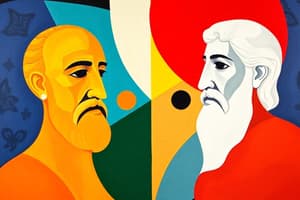Podcast
Questions and Answers
What is the goal of the Socratic method as described in the content?
What is the goal of the Socratic method as described in the content?
- To facilitate self-awareness through inquiry (correct)
- To establish definitive truths
- To memorize specific facts
- To eliminate all doubts
According to Plato, how does one achieve freedom from the body?
According to Plato, how does one achieve freedom from the body?
- Through physical exercise
- By acquiring knowledge of the senses
- Through contemplation (correct)
- By attaining wealth
Which statement reflects Descartes' view on existence?
Which statement reflects Descartes' view on existence?
- Memory defines one's physical presence
- Consciousness is an illusion
- Doubting proves the existence of the mind (correct)
- Existence is confirmed by sense perception
What does Locke argue regarding consciousness?
What does Locke argue regarding consciousness?
How does Plato characterize the body in relation to the soul?
How does Plato characterize the body in relation to the soul?
What is a key function of memory according to the content?
What is a key function of memory according to the content?
What did Descartes mean by 'Cogito ergo sum'?
What did Descartes mean by 'Cogito ergo sum'?
How are thoughts related to reality according to the content?
How are thoughts related to reality according to the content?
What distinguishes Descartes' view of the self from that of Locke?
What distinguishes Descartes' view of the self from that of Locke?
According to Hume, what is the nature of the self?
According to Hume, what is the nature of the self?
What aspect of human experience does the concept of Tabula Rasa emphasize?
What aspect of human experience does the concept of Tabula Rasa emphasize?
How is identity maintained according to Locke when consciousness is lost?
How is identity maintained according to Locke when consciousness is lost?
How does Hume's critique of the self challenge traditional notions of identity?
How does Hume's critique of the self challenge traditional notions of identity?
What does the mind-body dichotomy suggest about the relationship between thought and action?
What does the mind-body dichotomy suggest about the relationship between thought and action?
Which philosopher argued that a person's identity is maintained as long as they can remember their past?
Which philosopher argued that a person's identity is maintained as long as they can remember their past?
What key concept does Hume's philosophy introduce regarding the nature of the self?
What key concept does Hume's philosophy introduce regarding the nature of the self?
What is the primary function of the id in the tripartite division of the mind?
What is the primary function of the id in the tripartite division of the mind?
How does the ego primarily function in the context of the mind's tripartite structure?
How does the ego primarily function in the context of the mind's tripartite structure?
What does the superego represent in terms of human behavior?
What does the superego represent in terms of human behavior?
Which statement best describes mental traits according to the content?
Which statement best describes mental traits according to the content?
What is meant by the term 'phenomenally conscious' in relation to self-awareness?
What is meant by the term 'phenomenally conscious' in relation to self-awareness?
Which principle does the ego operate according to?
Which principle does the ego operate according to?
In the context of self-consciousness, what does 'transcendental apperception' refer to?
In the context of self-consciousness, what does 'transcendental apperception' refer to?
What does the statement 'The mind is not a distinct, non-physical entity' imply?
What does the statement 'The mind is not a distinct, non-physical entity' imply?
What function does the superego primarily serve in the conflict between the id and superego?
What function does the superego primarily serve in the conflict between the id and superego?
According to Gilbert Ryle, what is the primary misunderstanding in the concept of the mind?
According to Gilbert Ryle, what is the primary misunderstanding in the concept of the mind?
What does eliminative materialism propose?
What does eliminative materialism propose?
How does the ego interact with the id and superego?
How does the ego interact with the id and superego?
Which statement best reflects the notion that 'behavior reveals the mind'?
Which statement best reflects the notion that 'behavior reveals the mind'?
In Ryle's perspective, how is the 'self' defined?
In Ryle's perspective, how is the 'self' defined?
What is the morality principle's role in the development of the mind?
What is the morality principle's role in the development of the mind?
What does the struggle between the id and superego primarily take place?
What does the struggle between the id and superego primarily take place?
What is the main consequence of incongruence between real and ideal selves?
What is the main consequence of incongruence between real and ideal selves?
Which of the following describes the origin of the false self?
Which of the following describes the origin of the false self?
Which component of self-concept reflects what one thinks about themselves?
Which component of self-concept reflects what one thinks about themselves?
What defines the ideal self in self-concept terms?
What defines the ideal self in self-concept terms?
Which type of false self is characterized by feeling connected to the true self?
Which type of false self is characterized by feeling connected to the true self?
What influences the formation of self-schemas?
What influences the formation of self-schemas?
Which statement best represents the concept of an unhealthy false self?
Which statement best represents the concept of an unhealthy false self?
What is the primary role of the true self?
What is the primary role of the true self?
Flashcards are hidden until you start studying
Study Notes
Socratic Method and Self-Knowledge
- Knowledge is restored through questioning and answering, fostering self-awareness.
- Human beings comprise a body (imperfect and changing) and a soul (true, permanent, and unchanging).
- The soul is regarded as the true self, while the body is viewed as a prison; freedom comes through contemplation.
Theories of Consciousness and Identity
- Descartes asserts “Cogito, ergo sum" (I think, therefore I am), underscoring consciousness as proof of existence.
- Doubting confirms the existence of the mind, while perceptions through senses remain questionable.
- Personal identity emerges from consciousness, not merely the brain or body.
Mind-Body Dichotomy
- Mind and body are separate but interact closely; thought always precedes action.
- Descartes posits the self as a "thinking thing", existing in the mind rather than the physical body.
John Locke's Perspective
- Locke introduces the "Tabula Rasa" concept, asserting individuals are born as blank slates, defined by experiences.
- Memory plays a critical role in maintaining identity over time; continuous recollections create self-consistency.
David Hume's Philosophy
- Hume challenges the existence of a stable self, suggesting identity consists of ever-changing perceptions.
- "What worries you, masters you," reflects the influence of emotions and perceptions on self-identity.
Psychoanalytic Theory - Sigmund Freud
- Freud's tripartite model includes the id (instinct-driven), ego (reality-based), and superego (morality-enforcing).
- The id seeks immediate gratification; the ego mediates between id impulses and superego demands.
- The superego evolves through social norms and family influences, shaping moral behavior.
Behavioral Approach to Mind and Self
- Ryle critiques dualism, suggesting that discussions of the mind pertain to observable behaviors rather than a non-physical entity.
- Behavior reveals mental states; the ego exemplifies the balance between instinct (id) and morality (superego).
Paul and Patricia Churchland's View
- Claims that traditional ideas about the mind are flawed; they endorse eliminative materialism.
- "The self is the brain," indicating a focus on neurological processes over abstract mental concepts.
Self-Concept and False Self
- Self-concept encompasses beliefs and attitudes regarding one's existence, influenced by social interactions and experiences.
- Incongruence arises when there is a mismatch between real and ideal selves, leading to maladjustment.
- The false self develops from childhood experiences, especially inadequate maternal care, and acts as a protective layer.
Types of False Self
- Healthy False Self: Functions socially while remaining connected to the true self without guilt.
- Unhealthy False Self: Exhibits compliance at the expense of authenticity, resulting in a disconnection from the true self.
Self-Components
- Self-worth (self-esteem), self-image, and ideal self all contribute to overall self-concept.
- Self-schemas are shaped by personal experiences, personality traits, and social feedback, influencing how individuals perceive themselves.
Studying That Suits You
Use AI to generate personalized quizzes and flashcards to suit your learning preferences.




